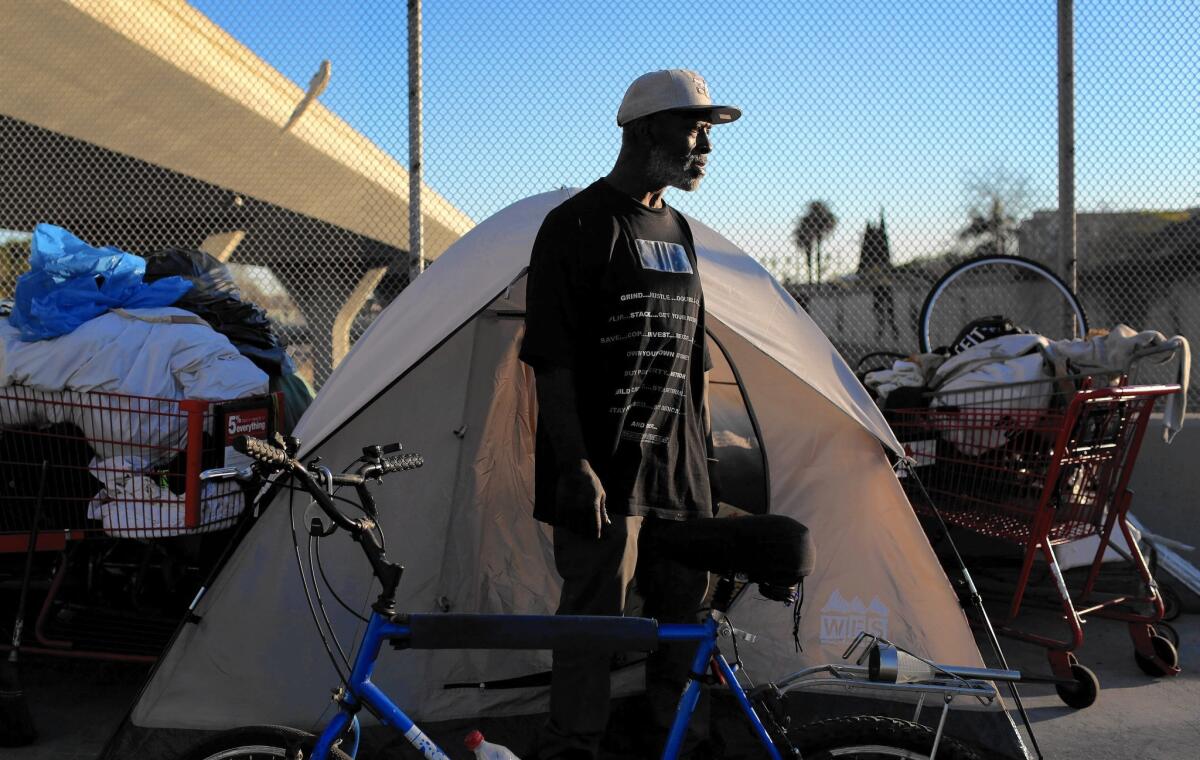How an emergency declaration over L.A.’s homeless became a game of ‘hot-potato keep-away’

- Share via
In November, as a forecast of severe winter weather seemed to threaten Los Angeles’ homeless population, activists clamoring for Mayor Eric Garcetti to declare a citywide state of emergency had little luck.
Garcetti resisted the idea of an emergency proclamation — a move that would enable him to assume broader executive and police powers in the fight against homelessness — describing it as a “rabbit hole” that risked distracting from long-term solutions to the plight of thousands who live on L.A.’s streets.
Some homeless activists found the mayor’s inaction galling. But he may have been more amenable to their arguments than he let on. Shortly after declining to declare an emergency, Garcetti quietly wrote a letter asking for a similar proclamation from Gov. Jerry Brown.
“While the weather system will make life difficult for millions in California, it is imminently life-threatening to the more than 17,000 homeless Angelenos who live on the streets,” he wrote on Dec. 15.
Brown rejected the request, according to officials in the governor’s office, arguing it would be unwise to declare a state of emergency before anticipated El Niño rains actually arrived. His hesitation now looks prescient: The pounding storms forecast for Southern California this winter have for the most part not materialized.
While the weather system will make life difficult for millions in California, it is imminently life-threatening to the more than 17,000 homeless Angelenos who live on the streets.
— Mayor Eric Garcetti, in a letter asking Gov. Jerry Brown to declare a state of emergency
Although the homeless have suffered — during a rainy stretch in January, a 60-year-old woman died of exposure on a downtown sidewalk — the weather’s human toll has not been as dire as some predicted.
The request to the governor’s office, previously undisclosed, nevertheless sheds light on Garcetti’s back-channel actions during a period when city officials and homeless advocates were struggling to prepare for the expected El Niño onslaught.
Gary Blasi, a retired professor at the UCLA School of Law and longtime homeless advocate, said the letter also raises questions about why Garcetti, in light of the potential catastrophe he described to Brown, did not assume emergency powers himself.
Garcetti’s request is “exactly contrary to what he was saying as to why he was not declaring a local state of emergency,” said Blasi, who in the fall urged the mayor to issue such a declaration. “It’s either an emergency circumstance or it’s not.”
Garcetti spokeswoman Connie Llanos said the mayor’s request to Brown had a pragmatic purpose: An emergency declaration from Sacramento would open the way to Federal Emergency Management Agency funding, which only the governor can formally request.
Llanos said the city’s public-safety workers were already carrying out some of the tasks they would have under a mayoral emergency declaration, but that outside money was needed to boost their efforts.
“We looked at everything — every tool we had available to us,” Llanos said. “What we really needed was additional funding, which is something that only the state, by accessing FEMA dollars, could have given us.”
Larry Gerston, a professor emeritus of political science at San Jose State University, said the unpublicized exchange between Garcetti and Brown — and the ultimate absence of an emergency declaration by either — may also point to the political dimensions of homelessness, an intractable problem in which many elected officials see little upside in exerting leadership.
“They’re sort of playing hot-potato keep-away,” Gerston said. “You’d much rather have somebody else get their hands dirty on this issue.”
The debate late last fall over some form of proclamation took place during a period of especially confused policymaking on homelessness. Faced with a homeless population that grew 12% during Garcetti’s first two years in office, L.A. City Council members held a news conference in September to announce their intention to declare a state of emergency on the issue.
However, subsequent scrutiny of city and state law found that such powers rested largely with the mayor, who could either declare a local state of emergency (subject to later council approval) or seek a more sweeping proclamation from the governor.
In the former case, the mayor could assume new power to create and enforce rules or requisition supplies “necessary for the protection of life and property.” By contrast, under a statewide declaration, emergency leadership powers would pass mostly to the governor, who could direct the state’s considerably greater resources to the city and also potentially seek federal disaster funding.
As the year’s end approached, Garcetti expressed little outward interest in using his own authority. Llanos said in November that Garcetti’s approach to sheltering the homeless from El Niño was “not about a technical definition of a state of emergency, which he never promised.”
In early December, Garcetti said criticisms about the lack of an urgent response to the predicted El Niño were “more of a perceptional issue” and suggested he was focused on long-range planning.
“I think everybody’s going down these rabbit holes of ‘state of emergency,’ this and that,” he said. “I’m less interested in short-term unease or criticism than long-term failure. I want to do this right. And if sometimes that means being quiet to put in place the things that you actually want to do to solve this, that’s OK with me.”
Llanos said the mayor’s comment about “rabbit holes” referred to the complexity of the issues involved, and was not meant to imply that an emergency declaration was unnecessary.
Less than two weeks later, Garcetti conveyed a different view of an emergency proclamation’s value — so long as it came from Brown.
“I understand you are reluctant to declare a State of Emergency to address this crisis. Nonetheless, I respectfully request that you reconsider that decision,” Garcetti wrote. “Your declaration … could make the difference in our ability to address this impending humanitarian crisis. Thousands of Angelenos are depending on swift action from their government.”
Twitter: @petejamison
Join the conversation on Facebook >>
ALSO
On the Streets: A 12-part video series about homelessness in Southern California
Finally, a smart approach to helping L.A.’s homeless
What those homeless camps along L.A.’s freeways mean for a public space once above it all
More to Read
Sign up for Essential California
The most important California stories and recommendations in your inbox every morning.
You may occasionally receive promotional content from the Los Angeles Times.










